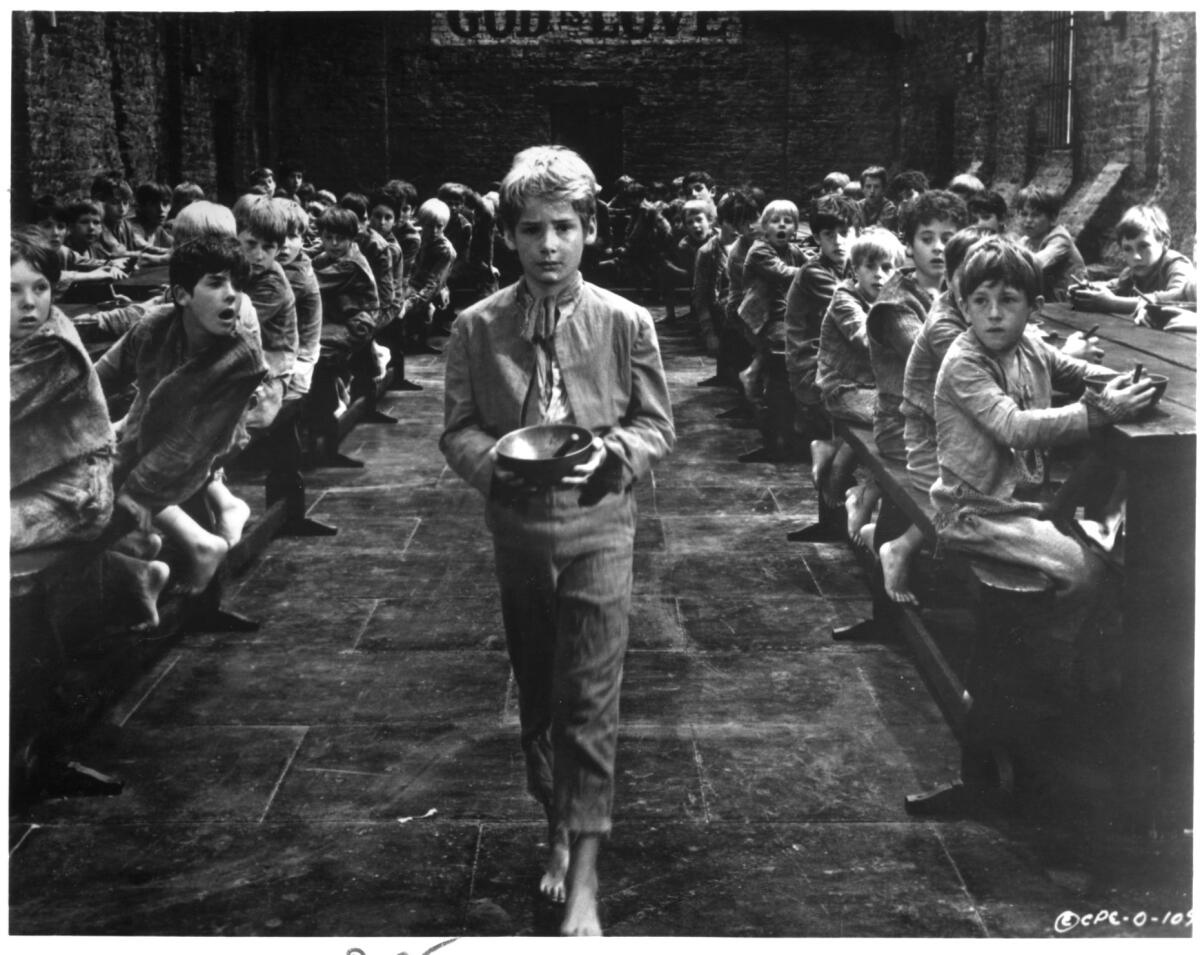From the Archives: Movie Review: ‘Oliver!’ opens on screen of Loew’s Beverly

- Share via
No small part of the bouncy charm of “Oliver!” is that the snakes in the grass have all the lines. Having stolen everything else in sight, the well-known Anglo-Saxon villain, Fagin, and his pint-sized sidekick, the Artful Dodger, also steal the picture.
The final score is not Bad Guys 2, Good Guys 0 by any means. Oliver Reed as Bill Sykes is thoroughly malevolent and scary (admirable as an actor, entirely hissable as a villain). And Mark Lester as Oliver Twist is a picture of cherubic and attractive innocence, exuding likability with every quavering line. And Shani Wallis is entirely sympathetic as a fallen good girl who untwists a bad life heroically.
What this all makes the score I can’t be sure.
It’s just that all the world loves a rascal, and Ron Moody as Fagin and young Jack Wild as the Artful Dodger are as artful and rascally a pair as you’ll meet in a good while. In their shreds and tatters and patches, they have joie de vivre as well as larceny in their hearts.
Moody, looping, leery and loose-jointed as a marionette with the audience on a string, emerges as a star character actor. He may owe a lot more to Lionel Bart (who wrote the original book, music and lyrics) than to Charles Dickens, but I doubt that there will be serious complaints. Indeed, I think there’s reason to be glad that Moody’s Fagin becomes so largely interdenominational, nonpartisan and doing his own thing.
Jack Wild is a beguiling lad in the best tradition of Peck’s Bad Boy or maybe an urban Huck Finn, and there seem to be no reasons for sociological concern over the fact that we end up rooting for the rascals.
“Lavish” is a lavishly overused word, but there’s no getting away from it in talking about this big, bright, expensive Columbia musical, which premiered here a couple days ago and is now in an exclusive run at the Loew‘s Beverly theater.
Producer John Wolf and the director Sir Carol Reed, have brought Dickensian in England to sprawling, boisterous life on a vast and remarkable scale. “Consider Yourself,” exuberantly choreographed by Onna White, swirls through the teeming market streets which are a wonderful tumult of life in commerce.
The production designer, John Box, has also given us a splendidly forbidding workhouse in which young Oliver vainly ask for more gruel and the even more forbidding Thames-side slums where Sykes lurks and Fagin has his pickpocket university. Not least, there is an elegant crescent of townhouses fronting a park, and all of this becomes the locale for yet another ebullient production number, “Wonderful Morning.”
The subsidiary casting seems uniformly first-rate. Hugh Griffith has an uproarious cameo as a non-teetotaling magistrate, and Harry Secombe is ideal as Mr. Bumble, the workhouse beadle. Hylda Baker and Leonard Rossiter are suitably irascible as the undertaking Sowerberries. Fagin’s boys are too many to mention, but they are a fine and winsome lot.
Onstage, “Oliver” was an appealing but less than surpassing entertainment, dominated by Sean Kenny’s stunning and ingenious sets. The transition to film has been not a transfer but a transformation, and it serves as an object lesson in the uses of the film medium.
John Green’s arrangement of the tuneful Bart score is full-bodied and bursting with vitality, and gives the music a new depth and dimension.
Dramatically, of course, the story deals with the basics of life — hunger, loneliness, greed, fear, goodness and evil, self-sacrifice, sorrow and joy — and it deals with them in unabashedly unequivocal ways. And director Reed, working from Vernon Harris’ screenplay, lets us have the basics just that way, without embarrassment or artificiality,
There are some minor flaws. Good as the production numbers are (and probably because everybody realized how well they were working), a couple of them go on for at least a couple of choruses too long and leave feelings not of fulfillment but of satiety. And while nobody expects Oliver himself to sing like anything but a young boy, his quavering hesitancy does set up a slight nervousness in the listener fairly quickly.
Still these are minor quibbles with a fine and satisfying movie that vibrates with life. It offers a good deal of merriment and a lot of suspense.
I don’t know what Ron Moody will do for an encore, but his Fagin is a wry, sly pleasure to watch, one of the great entertaining performances.
More to Read
Only good movies
Get the Indie Focus newsletter, Mark Olsen's weekly guide to the world of cinema.
You may occasionally receive promotional content from the Los Angeles Times.










